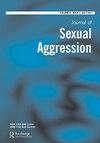Clinical applications of the structured assessment of protective factors against sexual offending (SAPROF-SO), Version 1
IF 1.5
4区 社会学
Q2 CRIMINOLOGY & PENOLOGY
引用次数: 1
Abstract
ABSTRACT The Structured Assessment of PROtective Factors against Sexual Offending (SAPROF-SO) is a new assessment tool designed to capture protective factors for individuals with a history of sexual offenses and aligns with a strengths-based approach to treatment. The SAPROF-SO, Version 1 consists of 14 items across three subscales: Resilience, Adaptive Sexuality, and Prosocial Connection & Reward. The optional fourth subscale, Professional Risk Management, consists of six items. The current paper seeks to provide guidance in the applied clinical use of the SAPROF-SO by addressing three advantages of the use of this instrument: (1) Facilitating engagement: establishing collaborative treatment goals and a therapeutic alliance, especially with clients who remain ambivalent about treatment; (2) Using the SAPROF-SO for risk management decision: determining the readiness for decreased supervision / increased level of privileges and the development of a risk management plan; and (3) Release planning for individuals with special needs. Case examples are provided. PRACTICE IMPACT STATEMENT The current paper provides an overview of a new assessment tool, Structured Assessment of PROtective Factors against Sexual Offending (SAPROF-SO), Version 1. The SAPROF-SO is designed to offer clinicians an assessment tool that aligns with a strengths-based approach to treatment, provides a structured assessment of protective factors, and brings balance to risk assessments. The current paper provides clinical guidance in using the SAPROF-SO to increase treatment engagement, assist with risk management decisions, and better assess individuals with special needs.性侵犯保护因素结构化评估(saprofo - so)的临床应用
摘要针对性犯罪保护因素的结构化评估(SAPROF-SO)是一种新的评估工具,旨在捕捉有性犯罪史的个人的保护因素,并与基于优势的治疗方法相一致。SAPROF-SO,第1版由三个分量表的14个项目组成:韧性、适应性性行为和亲社会联系与奖励。可选的第四个子量表“专业风险管理”由六项组成。目前的论文试图通过解决使用SAPROF-SO的三个优点,为SAPROF-SSO的临床应用提供指导:(1)促进参与:建立合作治疗目标和治疗联盟,特别是与对治疗仍持矛盾态度的客户建立合作治疗目标和治疗联盟;(2) 使用SAPROF-SO进行风险管理决策:确定减少监督/提高特权水平的准备情况,并制定风险管理计划;(3)为有特殊需要的个人制定释放计划。提供了案例示例。实践影响声明当前的论文概述了一种新的评估工具,即针对性犯罪的保护因素的结构化评估(SAPROF-SO),版本1。SAPROF-SO旨在为临床医生提供一种评估工具,该工具与基于优势的治疗方法相一致,提供对保护因素的结构化评估,并平衡风险评估。目前的论文为使用SAPROF-SO提高治疗参与度、协助风险管理决策以及更好地评估有特殊需求的个人提供了临床指导。
本文章由计算机程序翻译,如有差异,请以英文原文为准。
求助全文
约1分钟内获得全文
求助全文

 求助内容:
求助内容: 应助结果提醒方式:
应助结果提醒方式:


